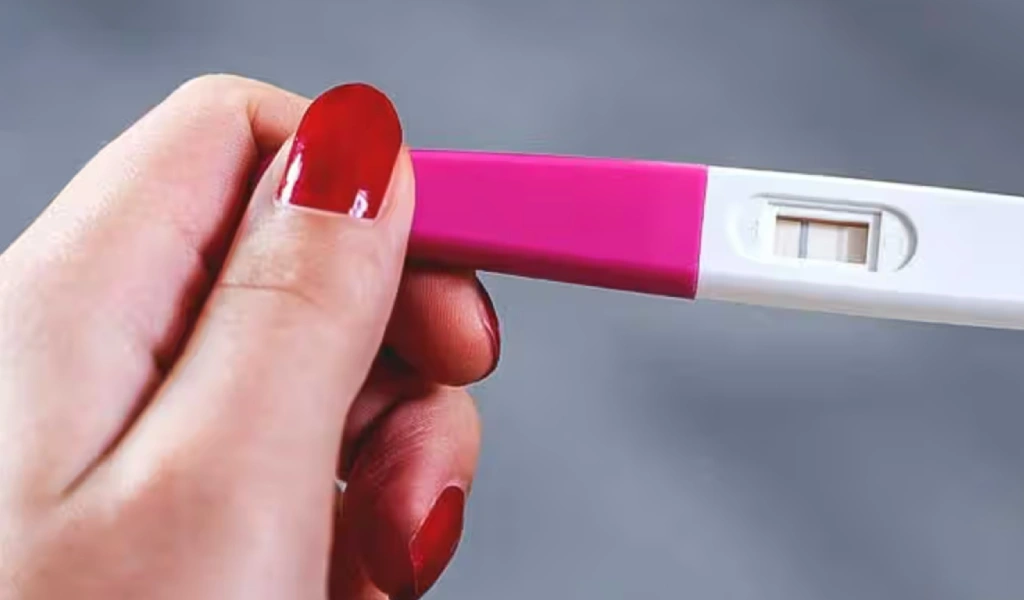In addition to missed periods, you can also watch for other indicators that could confirm pregnancy without taking any pregnancy tests.
If you are wondering how to confirm pregnancy without undergoing any pregnancy tests or using home-pregnancy test kits, this article ‘Is it possible to confirm pregnancy without taking a pregnancy test? ‘ is aimed at providing you with some information on this matter.
The most common indication of pregnancy in women is missed periods. However, some other signs and symptoms can confirm pregnancy but are not as prevalent in our lives. For example, sore breasts and dry skin could also confirm pregnancy pregnancy for some women.
In this article, we have gathered a compilation of various symptoms, both unusual and typical, that could confirm whether you are pregnant. Nevertheless, it is recommended that these symptoms should not be solely relied upon as confirmation of pregnancy, and it is essential to consult with a doctor for confirmation.
Top Signs that confirm Pregnancy without taking a pregnancy test
Here are a few signs that your body might exhibit when you are expecting a baby. Some pregnant women may experience some or all of these indications, whereas others may not experience any at all.
1. Absence of menstrual cycle
This could potentially confirm the beginning of a pregnancy. There are various reasons why you might miss your period, including factors like sudden weight changes, regular use of contraceptives, stress, overexertion, eating disorders, or gynecological issues. It is advisable to take a home pregnancy test or seek medical advice from a doctor approximately one week to ten days after experiencing a missed period to confirm pregnancy.
2. Identifying spotting
Approximately one to two weeks following the conclusion of the menstrual cycle, the presence of a slight discharge of blood may indicate implantation bleeding, resulting from the attachment of the embryo to the interior lining of the uterus. Nevertheless, instances of spotting may arise from various other causes, posing a challenge in conclusively attributing it to implantation. Furthermore, it is important to note that not all females will experience this form of bleeding.
3. Nausea and vomiting
Some women may experience nausea and morning sickness as soon as three weeks after becoming pregnant. Nausea can be triggered by the smell, taste, or mere thought of food. This could suggest an increase in hormone levels and potentially indicate that your body is getting ready for pregnancy. Not every pregnant woman experiences it early on, and some may not experience it at all in the initial month.
4. Constipation and bloating
Due to increased progesterone levels, women may encounter gas, bloating, flatulence, constipation, and excessive belching, as this hormone relaxes the smooth muscle tissue in the digestive tract, impacting the digestion process. Consequently, even small meals can leave women feeling full.
Abdominal bloating can be caused by factors other than pregnancy, such as indigestion and acidity.
5. Sore breasts and tingly nipples
Some women experience discomfort in their breasts, including soreness, pain, and sensitivity. The color of the areolas and nipples may change and small spots could develop around the nipples. Additionally, there might be white spots resembling pimples around the areola.
The transformations in the breasts might be confused as a sign of premenstrual syndrome rather than pregnancy, or the other way around.
6. Frequent urination
Sometimes, fluctuations in hormones can cause blood flow and water retention to increase, which in turn leads to more frequent filling of the bladder. In addition, the growing uterus can exert pressure on the bladder, resulting in more frequent and increased urination.
This signal might confuse, particularly during the winter months when the chilly weather can enhance the need to urinate. Other factors for frequent urination include urinary incontinence and having an overactive bladder.
7. Having Back pain
Your lower back may experience the same type of discomfort as that which occurs before and during menstruation. This pain typically manifests around the sacroiliac joint.
The pain felt during pregnancy can resemble menstrual cramps, leading to confusion and making it difficult to confirm if you are pregnant.
8. Facing Headaches
Headaches can also confirm pregnancy and may occur early in the pregnancy. However, headaches are common symptoms that alone may not confirm pregnancy. To confirm pregnancy, it is important to look for other signs and symptoms that may be present along with headaches. In cases where headaches are frequent, severe, and accompanied by dizziness, it is recommended to seek medical advice.
9. Irritability or mood swings
Due to hormonal changes affecting neurotransmitter levels in the brain, you may experience increased sensitivity, irritability, and sadness. These changes can lead to heightened emotions, both negative and positive. However, these emotions may resemble symptoms of PMS and may not necessarily confirm pregnancy.
10. Food aversions/cravings
Changes in appetite, desire for certain foods, or experiencing a dislike for certain odors as a result of changes in smell perception may confirm a pregnancy. These cravings and aversions can occur at any point during pregnancy.
Dhimona, a mother of two from the US, noticed differences in her ability to smell and taste before discovering she was pregnant. She recalls I found myself unable to tolerate the aroma of cooking rice and raw onions. Rice is a common food in our household, so it was strange waking up one morning and feeling nauseous at the smell of rice cooking in the rice cooker. Strong perfumes also made me feel ill.
11. Fatigue and sleeplessness
Higher levels of progesterone, along with feelings of nausea and frequent trips to the bathroom, may result in difficulties sleeping and feelings of exhaustion. While you may experience increased energy levels during the second trimester, fatigue could make a comeback in the third trimester.
Various other factors can cause sleeplessness or insomnia, including stress, depression, unhealthy sleep patterns, or the use of certain medications.
12. Palmar erythema
Redness on the palms, also known as red palms, may be observed in certain situations. This condition can be attributed to abnormal levels of estradiol, a hormone primarily found in women.
There could be various explanations for this, such as genetics, liver issues, autoimmune conditions, infections, or lifestyle modifications.
13. Nasal congestion
An increase in hormonal levels and blood production can impact the mucous membranes in the nostrils, causing them to swell, become dry, and potentially bleed. As a result, this may cause symptoms of a runny or congested nose.
Nasal congestion, like headaches, is a common symptom that can occur during pregnancy. It is important to consider this symptom along with other signs of pregnancy.
14. Low sexual desire
Research indicates that certain pregnant women have noticed a decrease in their sexual desire during the first trimester, with a further decrease as the pregnancy advanced. Nevertheless, the available evidence is based on looking back at past experiences.
15. Cramping
Experiencing slight cramps similar to those felt during menstrual periods is a frequent indicator of being pregnant. These cramps are typically mild and intermittent. Nevertheless, if the cramps are severe or localized to one side of the body, it is advisable to seek medical advice as it may indicate an ectopic pregnancy or other complications.
16. Acne
Acne breakouts may occur due to a rise in hormonal activity, similar to what can happen during menstruation.
The signs mentioned above, in addition to other signs such as elevated basal body temperature, changes in cervical mucus, and increased vaginal discharge, could confirm pregnancy, although they could also be caused by other health issues.
Many women often wonder how they can confirm if they are pregnant without taking a test. It is possible to confirm pregnancy through medical examinations or by using home urine tests. While certain early symptoms may confirm pregnancy, such as missed periods, spotting, sore breasts, and nausea, they are not always reliable. Other signs of early pregnancy can include nasal congestion, reduced libido, food cravings or aversions, and feeling tired. Women who monitor their ovulation and menstrual cycles, especially if they are regular, may be able to detect pregnancy sooner than others.
Key Pointers of ‘Is it possible to confirm pregnancy without taking a pregnancy test? ‘
Missing a period is a clear sign of being pregnant, although there are other less common indicators as well.
Some common symptoms of pregnancy include frequent urination, sore breasts, back pain, nasal congestion, and fatigue.
It is important to seek medical confirmation of pregnancy even if you experience all of these symptoms.



























